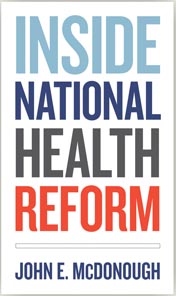You’ve read the Affordable Care Act (OK, maybe not all of it, but you’ve talked to someone who read it, or maybe even someone who helped write it). Now come two new books on the law’s making and place in health care policy history.

The first, “Inside National Health Reform,” is written by John McDonough, the Harvard health policy professor who advised U.S. Sen. Edward Kennedy when the law was being formed (and who has been a contributor to Kaiser Health News.) The book was published over the summer, giving readers like Austin Frakt over at the Incidental Economist time to digest it.
Frakt today writes:
McDonough was (is) a true insider, having served as senior adviser to the Senate Committee on Health, Education, Labor and Pensions, which granted him access to many crucial meetings and key individuals. He put his inside knowledge to use in the first part of the book, where you’ll find many of the quotes I posted while reading (see the INHR tagged posts).
The second part, which explains the actual law, surprised me. I expected a dry recounting of the gist of titles, subsections, amendments, etc. That would be boring. … Well, yes, he did recount what the law says, but he broke it up with long passages explaining how key portions of the bill came together politically and how they fit into the context of the U.S. health system.

The second book, coming out next month, is Princeton University professor Paul Starr’s “Remedy and Reaction.” Starr won the Pulitzer Prize for his 1984 book “The Social Transformation of American Medicine.” His new book takes a longer view than McDonough’s book does, retracing the rise and fall of the Clinton health care plan in 1993 and going forward. Here’s Frakt’s rave of that book:
The overarching thesis has little to do with Clinton, directly. It’s that America has found itself in a policy trap. Having subsidized insurance for most voters — workers (through the tax exemption of employer-sponsored plans) and seniors (Medicare) — many find it hard to see any self-interested reason to pay for coverage expansion. … But the focus is health reform with an eye on the (largely) health insurance reform enacted in 2010.






